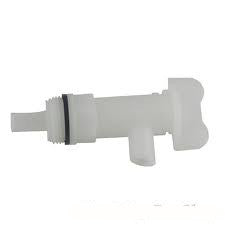steve roth
Member
- Joined
- Jan 11, 2018
- Messages
- 9
- Reaction score
- 0
My son and I have started a batch of beer. Fermentation has clearly taken place but we are about 10 days in and the hydrometer is stuck at 1.12. What should I do.

It’s a St. Peter’s ruby red kit. The surface of the beer is one mark below the black band on the hydrometer. I read it as 1.12 but I believe that is 1.012. The room has been at a temperature of about 22 degrees c.











![Craft A Brew - Safale S-04 Dry Yeast - Fermentis - English Ale Dry Yeast - For English and American Ales and Hard Apple Ciders - Ingredients for Home Brewing - Beer Making Supplies - [1 Pack]](https://m.media-amazon.com/images/I/41fVGNh6JfL._SL500_.jpg)
If you're kegging and force carbonating, you don't need to add anything else, but would benefit from leaving the beer for another week or so in the fermentor. Even though the beer is at final gravity (no more sugar to ferment) the yeast are still 'cleaning up' after themselves - removing some other stuff that is made during fermentation. You'll get a cleaner tasting beer if you leave it a while (or keg it now but keep warm for a while).
If you're bottling or naturally carbonating in the keg you'll need to add sugar. Go ahead and do this now - the yeast will continue to clean up in the bottle/keg.
If you're kegging and force carbonating, you don't need to add anything else, but would benefit from leaving the beer for another week or so in the fermentor. Even though the beer is at final gravity (no more sugar to ferment) the yeast are still 'cleaning up' after themselves - removing some other stuff that is made during fermentation. You'll get a cleaner tasting beer if you leave it a while (or keg it now but keep warm for a while).
If you're bottling or naturally carbonating in the keg you'll need to add sugar. Go ahead and do this now - the yeast will continue to clean up in the bottle/keg.
Is there any data on this (letting the yeast clean up)? And what specifically does this mean? I’ve cold crashed at 9 days and 14 days and notice no difference. This on a beer that finished fermenting by day 4.
Probably a daft question, but do I have to carbonate/add sugar at all. I am going to barrel the beer and didn’t intend to force carbonate it (as I don’t like it too gassy.). I wax just going to put it in the barrel as it is and leave it for a few weeks. But if I do have to add sugar - how much is best.
Is there any data on this (letting the yeast clean up)? And what specifically does this mean? I’ve cold crashed at 9 days and 14 days and notice no difference. This on a beer that finished fermenting by day 4.
Probably a daft question, but do I have to carbonate/add sugar at all. I am going to barrel the beer and didn’t intend to force carbonate it (as I don’t like it too gassy.). I wax just going to put it in the barrel as it is and leave it for a few weeks. But if I do have to add sugar - how much is best.
Sounds ready for bottles.It’s a St. Peter’s ruby red kit. The surface of the beer is one mark below the black band on the hydrometer. I read it as 1.12 but I believe that is 1.012. The room has been at a temperature of about 22 degrees c.
Have I ruined the beer? Added sugar. There was lots of bubbles as soon as I added the sugar. However there was lots of undigested blobs of yeast and other stuff at the bottom of bucket - which is why It didn’t ferment as much as I had anticipated, I suspect. I put it into a barrel but a lot of the undigested yeast and sediment from the bucket went in the barrel with the beer. Two questions.
1.Have I ruined the beer or will it continue to ferment and clear in the barrel.
2. do I need to loosen the cap to let out any air to stop the barrel exploding

Have I ruined the beer? Added sugar. There was lots of bubbles as soon as I added the sugar. However there was lots of undigested blobs of yeast and other stuff at the bottom of bucket - which is why It didn’t ferment as much as I had anticipated, I suspect. I put it into a barrel but a lot of the undigested yeast and sediment from the bucket went in the barrel with the beer. Two questions.
1.Have I ruined the beer or will it continue to ferment and clear in the barrel.
2. do I need to loosen the cap to let out any air to stop the barrel exploding
here is the barrel. I only put it in today. If the trub is going to riuin the beer I could decant the beer to another barrel once the trub has settled again. Or am I just worrying unecessarily. Is there truble ahead?